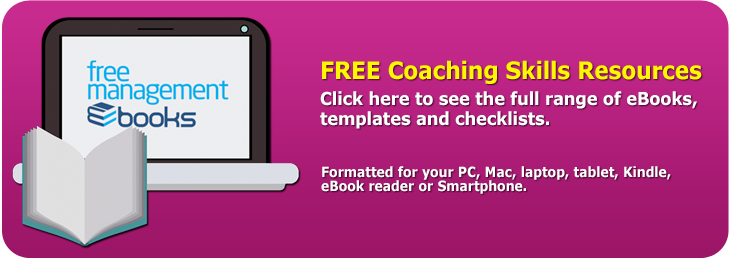Coaching Session Checklist
 |
||
 |
||
This Coaching Session checklist provides you with a list of items that will help you to remember to use each of the coaching skills you have developed, or want to develop, during each of your coaching sessions. You can use this list of reminders to assess how well you are developing each of these skills by putting a tick in the far right column every time you used this skill you to use each of your coaching skills during the session.
These skills include: questioning techniques, active listening, building rapport, demonstrating empathy, setting a goal, giving constructive feedback and using your intuition.
This checklist is designed to help you focus your coaching skills, which are often in conflict with how you normally operate as a manager. In fact, it can be difficult to switch off your natural management behaviors when you act as a coach.
For example, when delegating work you would normally instruct an individual to perform a specified task and then monitor (but not necessarily support) that person in how they perform it. In addition, you would usually provide feedback based on results rather than by on observation of how the task was done.
![]()
![]()
In your management role you also have a list of tasks that need to be conducted to ensure the smooth running of day-to-day operations and in order to achieve this you assign different tasks to different individuals. These tasks will already have a documented process and you only require the person to perform the task. You are not attempting to draw from that individual any new ideas of how to approach the task or expecting them to challenge this process's efficiency or purpose.
Coaching requires a different set of behaviors , for example: in a management role, you give explicit instructions to follow an existing process and then monitor progress towards the expected results. As a coach, you may implicitly question why the task is being done and how it is being done because this approach can encourage new ideas as it supports critical thinking and possible change.
Another important difference is that a coach needs to build a rapport based on trust and honesty, but as a manager you are often prevented from being totally open about certain issues because of things like internal politics and commercial confidentiality.
These factors present obstacles to internal coaching that you can overcome only by making a conscious effort. This checklist is designed to help you to do just that.


